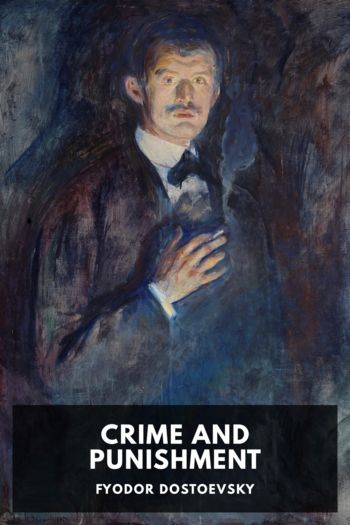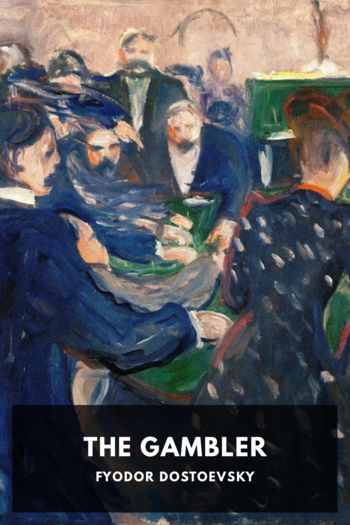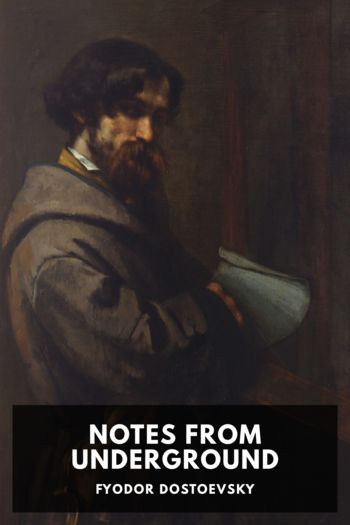Crime and Punishment by Fyodor Dostoevsky (love novels in english TXT) 📕

- Author: Fyodor Dostoevsky
Book online «Crime and Punishment by Fyodor Dostoevsky (love novels in english TXT) 📕». Author Fyodor Dostoevsky
Timidly and noiselessly a young girl made her way through the crowd, and strange was her appearance in that room, in the midst of want, rags, death and despair. She, too, was in rags, her attire was all of the cheapest, but decked out in gutter finery of a special stamp, unmistakably betraying its shameful purpose. Sonia stopped short in the doorway and looked about her bewildered, unconscious of everything. She forgot her fourth-hand, gaudy silk dress, so unseemly here with its ridiculous long train, and her immense crinoline that filled up the whole doorway, and her light-coloured shoes, and the parasol she brought with her, though it was no use at night, and the absurd round straw hat with its flaring flame-coloured feather. Under this rakishly-tilted hat was a pale, frightened little face with lips parted and eyes staring in terror. Sonia was a small thin girl of eighteen with fair hair, rather pretty, with wonderful blue eyes. She looked intently at the bed and the priest; she too was out of breath with running. At last whispers, some words in the crowd probably, reached her. She looked down and took a step forward into the room, still keeping close to the door.
The service was over. Katerina Ivanovna went up to her husband again. The priest stepped back and turned to say a few words of admonition and consolation to Katerina Ivanovna on leaving.
“What am I to do with these?” she interrupted sharply and irritably, pointing to the little ones.
“God is merciful; look to the Most High for succour,” the priest began.
“Ach! He is merciful, but not to us.”
“That’s a sin, a sin, madam,” observed the priest, shaking his head.
“And isn’t that a sin?” cried Katerina Ivanovna, pointing to the dying man.
“Perhaps those who have involuntarily caused the accident will agree to compensate you, at least for the loss of his earnings.”
“You don’t understand!” cried Katerina Ivanovna angrily waving her hand. “And why should they compensate me? Why, he was drunk and threw himself under the horses! What earnings? He brought us in nothing but misery. He drank everything away, the drunkard! He robbed us to get drink, he wasted their lives and mine for drink! And thank God he’s dying! One less to keep!”
“You must forgive in the hour of death, that’s a sin, madam, such feelings are a great sin.”
Katerina Ivanovna was busy with the dying man; she was giving him water, wiping the blood and sweat from his head, setting his pillow straight, and had only turned now and then for a moment to address the priest. Now she flew at him almost in a frenzy.
“Ah, father! That’s words and only words! Forgive! If he’d not been run over, he’d have come home today drunk and his only shirt dirty and in rags and he’d have fallen asleep like a log, and I should have been sousing and rinsing till daybreak, washing his rags and the children’s and then drying them by the window and as soon as it was daylight I should have been darning them. That’s how I spend my nights! … What’s the use of talking of forgiveness! I have forgiven as it is!”
A terrible hollow cough interrupted her words. She put her handkerchief to her lips and showed it to the priest, pressing her other hand to her aching chest. The handkerchief was covered with blood. The priest bowed his head and said nothing.
Marmeladov was in the last agony; he did not take his eyes off the face of Katerina Ivanovna, who was bending over him again. He kept trying to say something to her; he began moving his tongue with difficulty and articulating indistinctly, but Katerina Ivanovna, understanding that he wanted to ask her forgiveness, called peremptorily to him:
“Be silent! No need! I know what you want to say!” And the sick man was silent, but at the same instant his wandering eyes strayed to the doorway and he saw Sonia.
Till then he had not noticed her: she was standing in the shadow in a corner.
“Who’s that? Who’s that?” he said suddenly in a thick gasping voice, in agitation, turning his eyes in horror towards the door where his daughter was standing, and trying to sit up.
“Lie down! Lie do-own!” cried Katerina Ivanovna.
With unnatural strength he had succeeded in propping himself on his elbow. He looked wildly and fixedly for some time on his daughter, as though not recognising her. He had never seen her before in such attire. Suddenly he recognised her, crushed and ashamed in her humiliation and gaudy finery, meekly awaiting her turn to say goodbye to her dying father. His face showed intense suffering.
“Sonia! Daughter! Forgive!” he cried, and he tried to hold out his hand to her, but losing his balance, he fell off the sofa, face downwards on the floor. They rushed to pick him up, they put him on the sofa; but he was dying. Sonia with a faint cry ran up, embraced him and remained so without moving. He died in her arms.
“He’s got what he wanted,” Katerina Ivanovna cried, seeing her husband’s dead body. “Well, what’s to be done now? How am I to bury him! What can I give them tomorrow to eat?”
Raskolnikov went up to Katerina Ivanovna.
“Katerina Ivanovna,” he began, “last week your husband told me all his life and circumstances. … Believe me, he spoke of you with passionate reverence. From that evening, when I learnt how devoted he was to you all and how he loved and respected you especially, Katerina Ivanovna, in spite of his unfortunate weakness, from that evening we became friends. … Allow me now … to do something … to repay my debt to my dead friend. Here are twenty roubles, I think—and if that can be of any assistance to you, then … I … in short,





Comments (0)